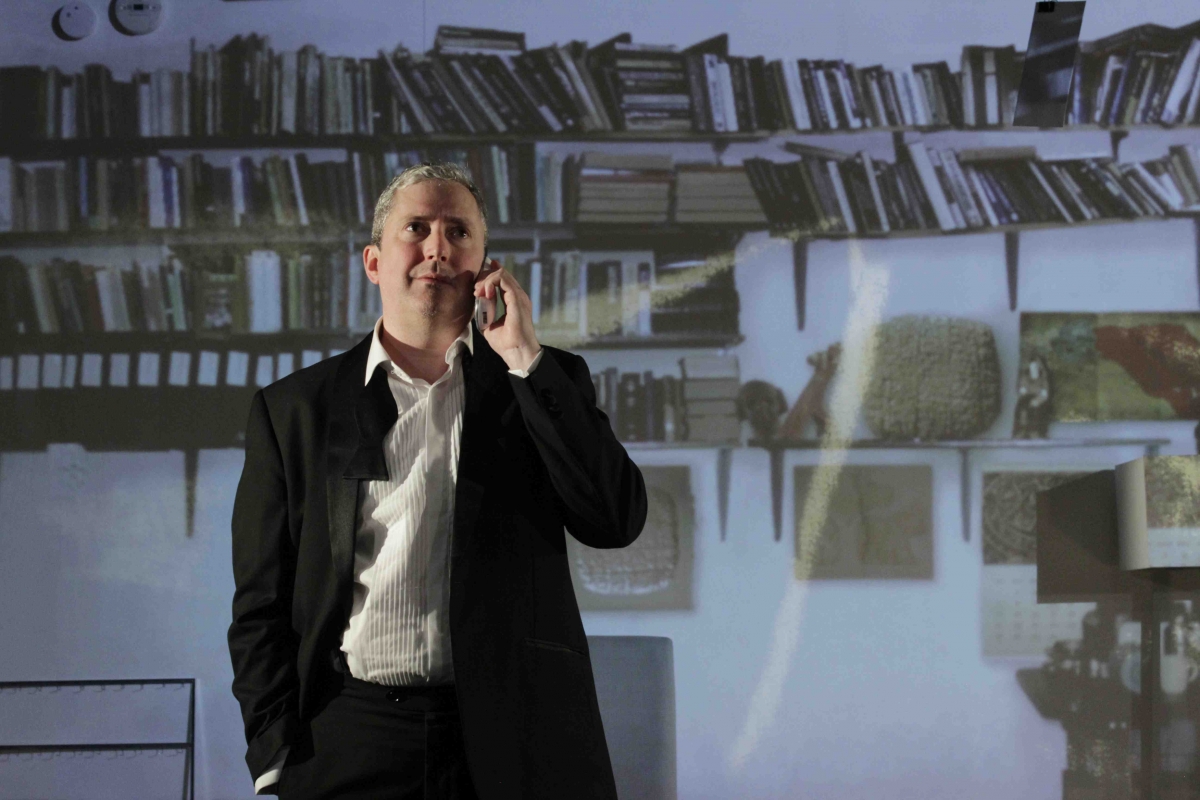
SPAM
Written by Rafael Spregelburd and translated by Jean Graham-Jones
Directed by Samuel Buggeln
Presented by The Cherry Arts
JACK, Brooklyn, NYC
April 14-30, 2016
Making a performance look easy is very difficult, but the fantastic new production of Argentine playwright Rafael Spregelburd's intricately-constructed SPAM makes it look effortless. SPAM, making its English-language première in a translation by the City University of New York's Jean Graham-Jones, probes some of those boundaries and spaces between appearance and reality, especially where language is concerned. Mario Monti (Vin Knight) is a linguistics professor with an ethically questionable relationship to the work of one of his thesis students and a case of amnesia from a head wound. As the play unfolds, both he and we come to understand more about how he ended up living in a hotel room in Malta, trying to hawk Chinese-manufactured talking dolls on the beach for cash and befriending a Swiss diver filming an underwater documentary.
In part, Monti's situation results from having taken a spam email up on its offer. The play brings the consequences of this choice to light while non-sequentially covering his previous 30 days. The sequence appears to be random: the Operator (Dominic Russo) chooses the order of these days, first from a calendar that hangs above the stage and then, after scattering the numbered cards from that calendar, from a bucket, like a Bingo caller. At first, Monti wears a bandage for days taking place after his injury, but abandons this distinction after a while, and he also eventually begins to refuse to perform certain days. The Operator additionally handles the videos, webcam, and overhead projector that augment Monti's storytelling.
The overhead projector spends much of its time covered in sand, in a symbolic echo of Monti's discussion of an extinct language whose speakers wrote a dictionary in moistened sand once they ran out of space to carve it into its stone buildings. SPAM is deeply interested in how language shapes possibilities within concrete and abstract thought, as well as in language as illusion, and in the disconnect between the signifier (a sign such as a word) and the signified (the ‘real’ thing to which the sign points). Amidst talking dolls hacked to say ‘bad’ words and spam emails run through Google Translate, it ask how we speak of and name things and why that matters. Mario Monti, for example, shares his name with the Prime Minister of Italy from 2011-2013, effectively erasing our protagonist from the virtual world of Google results. Even objects, such as Monti’s secondhand tux, can also signify, and have literature ”layered” on them.
Closely linked to SPAM's questions about language are its considerations of the notion of time, which at one point invoke Freud’s definition of the present as ritual repetition, an idea which figures prominently in Monti’s final solution to his predicament. Caravaggio's painting The Beheading of John the Baptist, with its signature also a possible confession to a crime, Dr. No, and Albert Camus' existentialist novel L'étranger all provide touchstones for these inquiries. Eventually, in one later scene, words and phrases accumulated from earlier in the play swirl out of control and out of context, displaced and repurposed signifiers becoming part of the fabric of a techno-scored dance.
In case that last sentence didn't make it obvious, it should be said that SPAM wraps all of these heady questions in an entertaining, often humorous story. Vin Knight gives an absolutely bravura performance. His Monti, who is onstage the entire time, is sometimes bewildered, sometimes dispirited, but remains charming and sympathetic even when he strays far from admirable. Dominic Russo nicely complements Knight, sometimes the distant puller of strings and other times adding both subtle and not-so-subtle comic moments.
Junk, says Monti, from spam to cheap dolls to the Italian cruise ship Costa Concordia, which struck a rock and sunk in 2012, is the most important thing propping up dying capitalism (as per Freud's idea of time, the death of civilizations and their languages can also be seen as an endless repetition). Capitalist society must create the need for such junk in order to survive, and this dynamic is reproduced in the virtual world. Capitalism, like and through language, exists on a foundation of illusions, to which we come to expect reality to conform. In the face of this, SPAM concludes that time is brief and all history is poetry. This production is not to be missed, so seize some of that brief time and meet Mario Monti. - Leah Richards & John Ziegler
